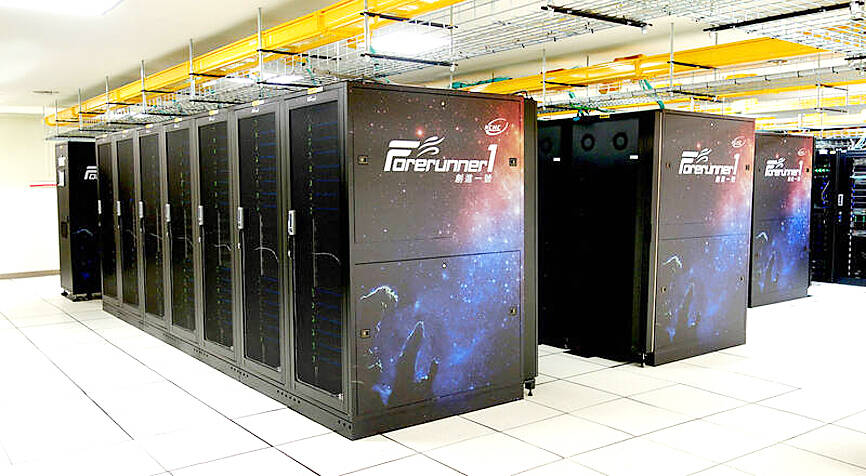The supercomputer Forerunner 1 (創進一號) has officially been launched for deployment in fields that require high-performance computing, including weather forecasts, astrophysics simulations, and engineering design and simulations, the National Center for High-Performance Computing said yesterday.
The center last year began building the next-generation supercomputer at its office in Tainan to replace the Taiwania 1 (台灣杉一號), which has been retired.
Forerunner 1 features 62,496 computing cores, with an overall performance capacity of up to 3.5 petaflops and 9.2 petabytes of storage, the center said.

Photo courtesy of the National Center for High-Performance Computing
For the first time, 40 ARM architecture computing nodes have been installed in the new supercomputer, allowing users to conduct preliminary heterogeneous architecture testing as a reference for the center when it builds new supercomputers in the future, it said.
The center has built supercomputers of different architectures to cope with large-scale scientific and artificial intelligence (AI) projects, it said.
The CPU-based Forerunner 1 is suitable for various high-performance computing tasks, including weather forecasts, astrophysics simulations, molecular model simulations, and engineering design and simulation.
Taiwania 1 was built in 2017 with a performance capacity of 1.7 petaflops, center director-general Chang Chau-lyan (張朝亮) said in a statement.
“With the rapid development of global high-performance computing and artificial intelligence, the improvement of computing power is directly related to the nation’s technological competitiveness,” Chang said.
“The center will gradually establish more powerful computing infrastructure,” he said.
The center is scheduled to complete the construction of 16 petaflops of graphics processing unit-based computing power by the end of this year to meet the needs of AI-related research and application, such as large language models, Chang said.
“We are also aiming to upgrade our computing power to 200 to 300 petaflops by 2028 to further enhance Taiwan’s competitiveness in global technology research and development,” he said.
During the pilot test, Forerunner 1 demonstrated excellent performance in many fields, including astrophysics, fluid mechanics, atmospheric science, high-energy physics and materials computing, the center said.
With the use of Forerunner 1, Academia Sinica’s astrophysics research has increased its computing speed by 5.3 times, while National Chung Hsing University and National Cheng Kung University have significantly increased the scale of fluid dynamics calculations and simulations, reducing the calculation time for billion-level ultra-fine grids from several months to 40 hours, the center said.
The next-generation supercomputer has helped elevate National Taiwan University’s air-sea coupling model test efficiency, which was 80 percent higher than that conducted by Taiwania 3, the center said.
Research on quantum chemistry and materials calculations has also been significantly accelerated, it said.

The Central Election Commission has amended election and recall regulations to require elected office candidates to provide proof that they have no Chinese citizenship, a Cabinet report said. The commission on Oct. 29 last year revised the Measures for the Permission of Family-based Residence, Long-term Residence and Settlement of People from the Mainland Area in the Taiwan Area (大陸地區人民在台灣地區依親居留長期居留或定居許可辦法), the Executive Yuan said in a report it submitted to the legislature for review. The revision requires Chinese citizens applying for permanent residency to submit notarial documents showing that they have lost their Chinese household record and have renounced — or have never

A magnitude 5.6 earthquake struck off the coast of Yilan County at 12:37pm today, with clear shaking felt across much of northern Taiwan. There were no immediate reports of damage. The epicenter of the quake was 16.9km east-southeast of Yilan County Hall offshore at a depth of 66.8km, Central Weather Administration (CWA) data showed. The maximum intensity registered at a 4 in Yilan County’s Nanao Township (南澳) on Taiwan’s seven-tier scale. Other parts of Yilan, as well as certain areas of Hualien County, Taipei, New Taipei City, Taoyuan, Hsinchu County, Taichung and Miaoli County, recorded intensities of 3. Residents of Yilan County and Taipei received

Taiwan has secured another breakthrough in fruit exports, with jujubes, dragon fruit and lychees approved for shipment to the EU, the Ministry of Agriculture said yesterday. The Animal and Plant Health Inspection Agency on Thursday received formal notification of the approval from the EU, the ministry said, adding that the decision was expected to expand Taiwanese fruit producers’ access to high-end European markets. Taiwan exported 126 tonnes of lychees last year, valued at US$1.48 million, with Japan accounting for 102 tonnes. Other export destinations included New Zealand, Hong Kong, the US and Australia, ministry data showed. Jujube exports totaled 103 tonnes, valued at

BIG SPENDERS: Foreign investors bought the most Taiwan equities since 2005, signaling confidence that an AI boom would continue to benefit chipmakers Taiwan Semiconductor Manufacturing Co’s (TSMC, 台積電) market capitalization swelled to US$2 trillion for the first time following a 4.25 percent rally in its American depositary receipts (ADR) overnight, putting the world’s biggest contract chipmaker sixth on the list of the world’s biggest companies by market capitalization, just behind Amazon.com Inc. The site CompaniesMarketcap.com ranked TSMC ahead of Saudi Aramco and Meta Platforms Inc. The Taiwanese company’s ADRs on Tuesday surged to US$385.75 on the New York Stock Exchange, as strong demand for artificial intelligence (AI) applications led to chip supply constraints and boost revenue growth to record-breaking levels. Each TSMC ADR represents